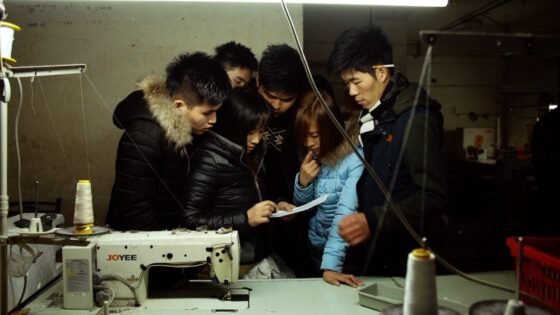Cinema Scope 95 Editor’s Note

By Mark Peranson
Every year, like clockwork, when I get back from Cannes I’m asked, “What were the highlights?” At this point it’s hard to tell as, to quote the future of film criticism ChatGPT, “No matter what cinematic offering graces the screen, the audience is quick to rise to their feet in a frenzied display of adulation. It’s as if the mere act of attending Cannes automatically transforms every film into a masterpiece, regardless of its actual quality. The standing ovation has become an empty gesture, devoid of genuine critical engagement. The Cannes audience has succumbed to the pressure of conformity, afraid to be the one dissenting voice amidst a sea of applause. It’s disheartening to witness the lack of discernment, as film after film is met with a standing ovation, blurring the line between true excellence and mediocre mediocrity. The rare moments of cinematic brilliance are lost in the sea of indiscriminate applause, drowned out by the noise of conformity and obligation. It’s time to reclaim critical discernment and genuine reactions, to challenge the status quo and dare to express our opinions without fear.”
To put this into perspective, ten or so years ago there would have been massive walkouts if not a torrent of boos for Wang Bing in the Lumière at the premiere of his new documentary Youth (Spring)—I’m old enough to remember how Hou Hsiao-hsien, among others, was treated—but even if not all those in attendance made it to the end that fair day, and the ovation for Wang was, well, muted, those glory days are gone. To be fair, one can genuinely argue that it is quite an advancement to have an egregiously long Wang Bing documentary in Cannes Competition (no comment on Kaouther Ben Hania), but I also have to say that there is no way that Thierry Frèmaux watched this film. No way. Still, I yearn to run into a filmmaker on the street in Cannes, ask them how their screening went, and have them tell me it went poorly. As is happens, I did run into Wang Bing the day after his premiere, and for some reason he was still wearing an ill-fitting tuxedo and comically large bow tie; I must say he looked pretty happy.
So highlights, yeah, there were a few, because there always are, but I’m not going to give you a list because “What were the highlights?” is a very boring question and, if I answered, you’ll probably disagree with me. Ask me about the lowlights and the floodgates will open. I can list numerous bad films (again, most people would disagree), bad political decisions (like banning any public demonstrations during the festival), bad online ticketing, bad weather (for the first half), bad food (not enough pot-au-feu), very bad wine—until I finally came to my senses and walked into La Vinotheque on May 25 (I receive no renumeration for this shout-out)…Come to think of it, I do have one personal highlight: being asked by a stressed-out French sales agent to vacate a full market screening to make room for an important American buyer who shall remain nameless and ended up buying said French film, which ended up winning a major prize (hint, it was not The Pot au Feu).
That being said, there should have been more Cannes “highlights” in the pages that follow from other people who supposedly like to get paid to praise cinema, but don’t get me started on writers or deadlines. I apologize if the final product isn’t up to the high standards of previous Cannes issues. This time around my usual annual ranting comes in an abridged version, as until two days before publication I still had no idea how much space I had free for ranting, and I wasn’t going to miss the opportunity to include some artificial intelligence—because ChatGPT was made for Cannes, an artificial festival mostly overseen by and attended by robots.
Mark Peranson

